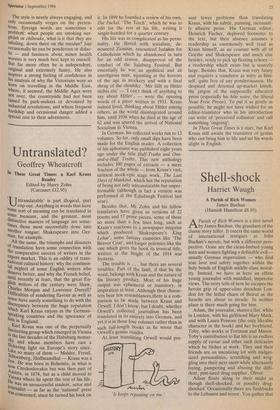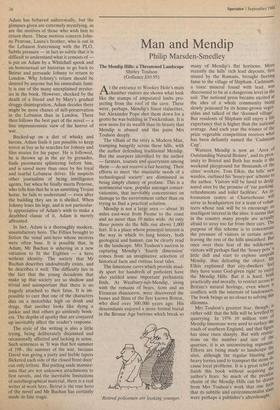Shell-shock
Harriet Waugh
A Parish of Rich Women James Buchan (Hamish Hamilton £8.95) AParish of Rich Women is a first novel by James Buchan, the grandson of the classic story teller. It enters the same world of international intrigues as John Buchan's novels, but with a different pers- pective. Gone are the clean-limbed young men and women fighting a definable evil — usually German imperialism — who find true love and safety together within the holy bonds of English middle-class moral- ity. Instead, we have as hero an effete young journalist with muddled, imprecise views. The story tells of how he escapes the heroin grip of upper-class decadent Lon- don for the lethal chaos of Beirut as the Israelis are about to invade. In neither place is there much going for him.
Adam, the journalist, shares a flat, while in London, with his girlfriend Mary Mark, and with Laura Penrose (the only likeable character in the book) and her boyfriend, Toby, who works at Fortnum and Mason. Toby's contribution to flat life is an endless supply of caviar and other such delicacies which he filches at work. They and their friends are an unenticing lot with midget- sized personalities, scratching and wrig- gling into their next snort while alternately laying, pampering and abusing the diffi- dent, pint-sized drug supplier, Oliver.
Adam floats along in their midst as though shell-shocked, or possibly drug- shocked: Occasionally there are flashbacks to the Lebanon and terror. You gather that Adam has behaved unheroically, but the glimpses given are extremely mystifying, as are the motives of those who wish him to return there. These motives concern John- ny Penrose, Laura's brother, who is out in the Lebanon fraternising with the PLO. Subtle pressure — in fact so subtle that it is difficult to understand what it consists of— is put on Adam by a Whitehall spook and an homosexual art historian to go back to Beirut and persuade Johnny to return to London. Why Johnny's return should be desired by anyone but his immediate fami- ly is one of the many unexplained myster- ies in the book. However, shocked by the death of a friend and by Mary's gradual druggy disintegration, Adam decides there might be more chance of self-preservation in the Lebanon than in London. There then follows the best part of the novel — a fine impressionistic view of the horror of war.
Bucked-up on a diet of whisky and heroin, Adam finds it just possible to keep terror at bay as he searches for Johnny and files stories for his paper. He is followed, he is thrown up in the air by grenades, finds pavements splintering before him, and is saved more than once by his loyal and tearful Lebanese driver. He suspects other journalists of being intelligence agents, but when he finally meets Penrose, who tells him that he is an unwitting Trojan horse, he fails to understand — even after the building they are in is shelled. When Johnny loses his legs, and is not particular- ly appreciative of Adam's wish to make a deathbed classic of it, Adam is merely affronted.
In fact, Adam is a thoroughly modern, unsatisfactory hero. The Fifties brought to fiction the venal anti-hero whose motives were often base. It is possible that, in Adam, Mr Buchan is ushering in a new variation to fit the Eighties — a hero without identity. The society that Mr Buchan describes undoubtedly exists, and he describes it well. The difficulty lies in the fact that the young decadents that make up that society are so shallow and trivial and unimportant that there is no tragedy attached to their fates. It is im- possible to care that one of the characters dies on a motorbike high on drink and drugs, that another looks like dying a junkie and that others go aimlessly bonk- ers. The depths of apathy that are conjured up inevitably affect the reader's response.
The style of the writing is also a little trying, being deliberately disjointed and occasionally affected and lacking in sense. Such sentences as `It was that hot summer of 198-, the summer of the war, because David was giving a party and feeble tapers flickered each side of the closed front door' can only irritate. But putting aside manner- isms that are not unknown attachments to first novels, and the inevitable limitations of autobiographical material, there is a real writer at work here. Beirut is the true hero of the novel and Mr Buchan has certainly made its fate tragic.











































 Previous page
Previous page